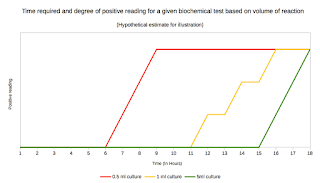C diff- The poop rescue
C. difficile (Often known as C diff!!!!), is a commensal bacterium in nearly 2-5% of population. The C. difficile is known to occur in a spore form (Non infectious environmental resistant form) and a vegetative infectious form. This organism is commonly found in the large intestine and inherently resistant to various forms of antibiotic. So what happens when a person gets heavily treated with oral antibiotics? Straight forward answer is the normal flora of the gut gets disrupted. Now that the C diff gets a chance (Selection pressure they say!), the organism pre dominates in the gut and plays smart. This causes a condition called "antibiotic-associated diarrhea (AAD)" or "Clostridium difficile associated diarrhea (CDAD)".
The pathogenic strains produce 2 toxins- TcdA and TcdB. These two toxins, TcdA and TcdB, are encoded on a pathogenicity locus along with negative and positive regulators. That means a fully functional pathogenicity island. Following expression and release from the bacterium, TcdA and TcdB reaches the cytosol of target cells and inactivate small GTP-binding proteins, which include Rho, Rac, and Cdc42. Inactivation occurs through monoglucosylation of a single reactive threonine, which lies within the effector-binding loop and coordinates a divalent cation critical to binding GTP. Ultimately this cause actin condensation and cell rounding, which is followed by death of the cell. TcdA elicits effects primarily within the intestinal epithelium, while TcdB has a broader cell tropism.
Fig: Taken from Daniel E. Voth and Jimmy D. Ballard (Further Reading 1)
Further
reading:
Pseudomembranous colitis (PMC), which is an infection of the large intestine (colon) with an overgrowth of Clostridium difficile bacteria is a very difficult to treat devastating problem. PMC is often associated with Ciprofloxacin, Levofloxacin, Amoxicillin, Ampicillin, Clindamycin, Cefixime and Cefpodoxime use. The condition often presents with bloody diarrhea and abdominal cramps. Unless treated vigorously the condition can worse clinically.
Now that you understand the C diff tricks so well and given the fact that it’s very difficult to treat the organism what do you do?
50 years ago when we didn’t have a good knowledge of what an intestinal micro flora is like and C diff was not properly known fecal flora was administered. The doc’s used to take a fresh healthy fecal sample and do some treatment of it and made the patient eat the stuff. I don’t know how exactly how they did it but for sure they treated the fecal samples in such a way that patient didn’t know what he was made to consume.
Now that was exactly what was replicated by Kelly etal in now what is called as “Fecal Microbiota Transplantation”. They studied 26 patients with relapsing C. difficile infection, who underwent FMT over a 28-month period. FMT was performed during colonoscopy by direct infusion of minimally processed donor stool. The results show about 92% effectiveness. Now what’s interesting to me from this study is the use of fecal samples. As per my understanding, the FMT is transferring the normal flora to a person who has depleted flora and restoring gut health. This could have also been done with a probiotics also. If there is a study with parallel controls, with probiotics and then results compared we will have a more reliable data. Of course this current study is just a case series and more needs to be studied.
So don’t be surprised if the pharmaceutical company asks for fecal donors and process it and markets it tomorrow. May be someone will eventually find the right cocktail of bacteria’s that can be incorporated into the gut to restore floral balance and ask the C diff to shut up.
Further
reading:
1. Daniel E. Voth and Jimmy D. Ballard. Clostridium difficile Toxins: Mechanism of Action and Role in Disease Clin. Microbiol. Rev. April 2005vol. 18 no. 2 247-263.
2. Thomas J, Borody & Alexander Khoruts. Fecal microbiota transplantation and emerging applications. Nature Reviews Gastroenterology and Hepatology. doi:10.1038/nrgastro.2011.244
3. Kelly, Colleen R. MD; de Leon, Lauren MD; Jasutkar, Niren MD. Fecal Microbiota Transplantation for Relapsing Clostridium difficile Infection in 26 Patients: Methodology and Results. Journal of Clinical Gastroenterology. February 2012 - Volume 46 - Issue 2 - p 145–14. doi: 10.1097/MCG.0b013e318234570b.






Comments
Post a Comment